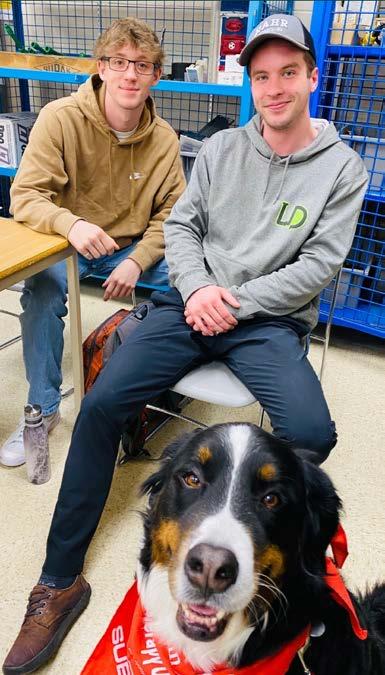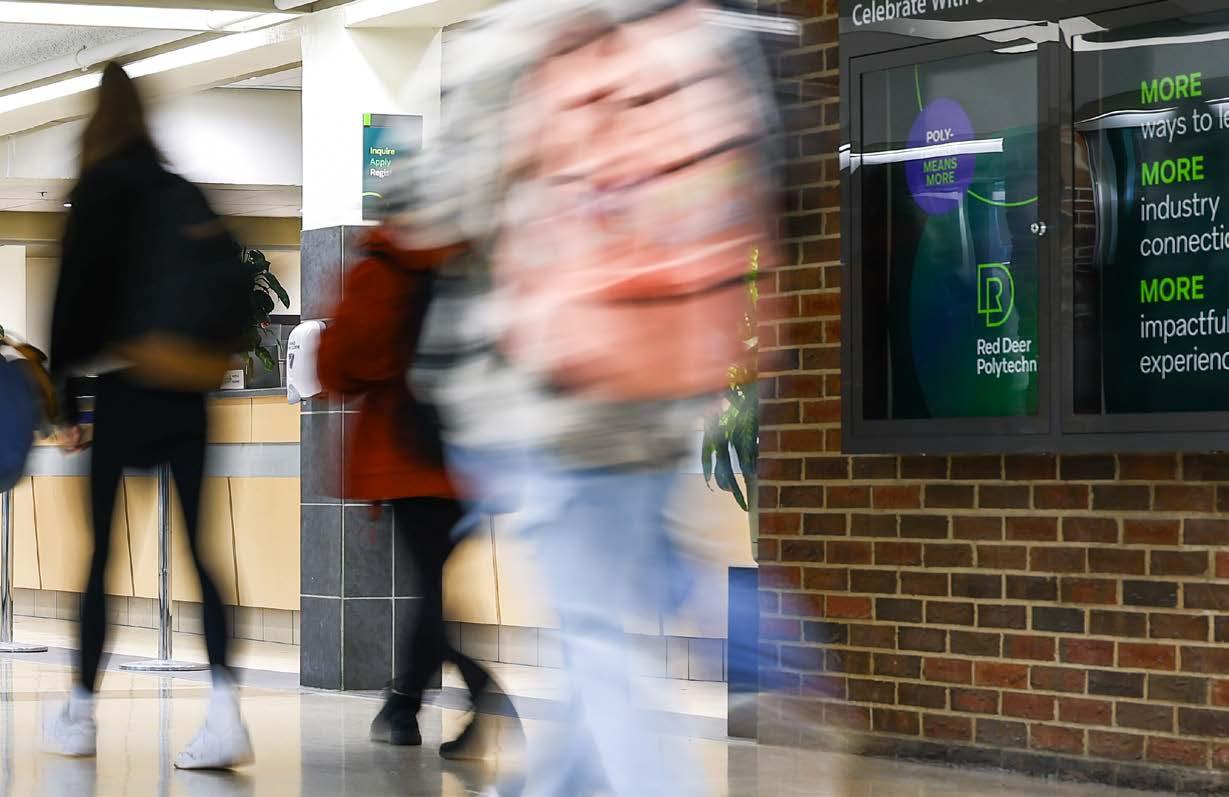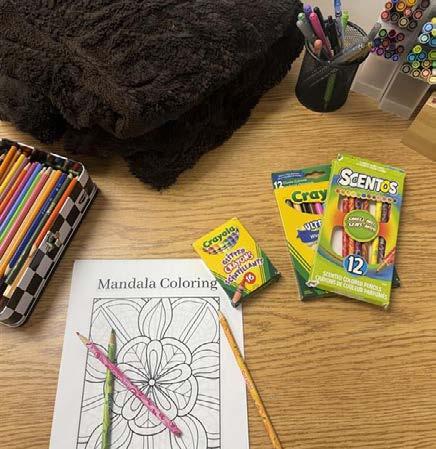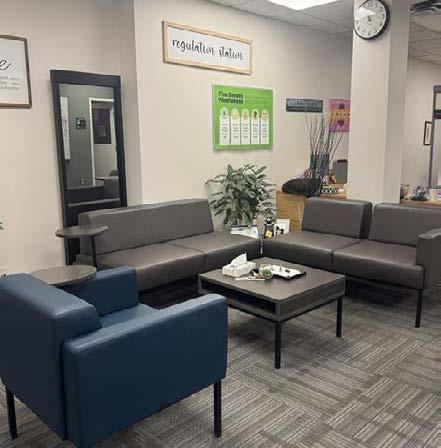Student Mental Health Strategy 2025–2028





Red Deer Polytechnic recognizes that our campus is situated on Treaty 7 land, the traditional territory of the Blackfoot, Tsuu T’ina and Stoney Nakoda peoples, and that the central Alberta region we serve falls under Treaty 6, traditional Métis, Cree and Saulteaux territory.
We honour the First Peoples who have lived here since time immemorial, and we give thanks for the land where RDP sits. This is where we will strive to honour and transform our relationships with one another.
As outlined in our Reconcili-Action Plan 2023-2028, Red Deer Polytechnic is committed to education as reconciliation through action.
OPEN HEARTS
We are intent on building meaningful reciprocal relationships between RDP and Indigenous Peoples of Turtle Island, which involves resourcing engagement for long-term, long-lasting relationships.
OPEN DOORS
We are committed to utilizing the RDP resources and network to create more pathways for Indigenous learners, which is about identifying and addressing barriers to post-secondary participation and learning.
OPEN EYES
We honour and hold space for Indigenous Peoples, recognizing we are not observers of the relationship, but co-authors, participants and learners acting with critical intentionality.
OPEN VOICES
We welcome discourse and the sharing of perspectives on our efforts to engage education and reconciliation as it is not just our path forward alone, which means we are invested in listening, growing and co-creating together.
This strategy has drawn on the collective wisdom of diverse students, staff, faculty and community partners. However, the information gathered was compiled, interpreted and consolidated by RDP professionals. As with all professionals within higher education, the choices made in authoring this strategy are shaped by experiences, education and certainly a level of privilege. The professionals and students below played a key role in developing this strategy:
• Kristine Plastow, MA (she/her) Associate Vice President, Student Experience
• Tanya Lyons-Belt, M.Ed.(she/her) Associate Dean, Student Supports
• Anomi Bearden, Ph.D.(she/her) Psychology Instructor
• Jamie Prowse Turner, Ph.D. (she/her) Psychology Instructor
•Joanna Watson (she/her) Intake Coordinator
•Samantha Cooley-Morrison, BHSc (she/her) Mental Health Education Coordinator
•Candice Brown, BA (she/her) Student Wellness Coordinator; Students’ Association of RDP
•Star Clynes, BSc (she/her) Student
•Amalia Uliniuc, BA (she/her) Student
•Dusty Karpovich (he/him) Student
•Dustin Lawrence (he/him) Student

As the Vice President of Academic and Student Experience at Red Deer Polytechnic (RDP), I am pleased to present the Student Mental Health Strategy outlining our key priority areas for enhancing student mental health and wellbeing.
Learner Impact is the first strategic driver in our 2030 Strategic Plan: Productivity and Social Impact and it represents our commitment to ensuring that all students feel represented, have a sense of belonging at RDP and have the highest quality learner experience. The strategies detailed in the Student Mental Health Strategy reflect our commitment to fostering an environment that supports students through their academic journeys and their life challenges.
We believe in approaching students holistically, recognizing the interconnectedness of their academic, emotional, social and physical wellbeing. We also recognize that students expect to bring their whole selves to campus and we are dedicated to fostering inclusive environments that cultivate and celebrate all parts of who they are.
By focusing on four critical areas—Enhancing Community Foundations, Enhancing a Caring Campus Climate, Enhancing Targeted Supports and Enhancing Complex Wrap-Around Supports—we aim to create a more inclusive, connected and resilient campus community. These priority areas address immediate needs and lay the groundwork for long-term sustainable support systems, ensuring that all students have access to the resources and opportunities they need to thrive.
Through collaboration, innovation, and ongoing dedication, we are working to make RDP a place where every student feels supported, valued and empowered.
Lindsay Engel
We aim to create a more inclusive, connected and resilient campus community.

Red Deer Polytechnic (RDP) recognizes the critical importance that student mental health has on social engagement, physical health, economic stability and overall wellbeing. Conversely, all areas of wellbeing significantly impact mental health. Mental health, in the context of this strategy, is the ability to manage life’s challenges, function effectively and contribute to the community. Wellbeing represents the highest quality of life across cultural, emotional, mental, physical, social and spiritual domains.
Given the interaction between these domains, student mental health and wellbeing require a collaborative, holistic approach that extends beyond student support services. “Student mental health and wellbeing is a shared responsibility. Post-secondary institutions cannot meet this growing challenge alone. An approach to supporting student mental health and wellbeing that encompasses all students, faculty, and staff within the post-secondary community, in addition to all stakeholders in the broader community, is vital” (Government of Alberta, 2022).
Integrating comprehensive feedback and data from the lived experiences of students, staff and community during the 2023-2024 academic year, the RDP Student Mental Health Strategy 2025-2028 stands as a sustainable and flexible framework. The objectives celebrate and promote mental health and wellbeing through enhancing four priority areas: Community Foundations, a Caring Campus Climate, Targeted Supports, and Complex Wrap-around Supports at RDP. Each area addresses distinct needs but collectively strengthens mental health and wellbeing across RDP and beyond. This diverse and holistic range of supports work to provide a stronger impact, not only within the RDP community, but extending to families, industries and the broader community of Red Deer.
The strategy is a dynamic, evolving document that will adapt to emerging trends and challenges. Regular reviews and performance measures will ensure continuous improvement and adaptability to new challenges.
Understanding the historical, economic and political landscape surrounding Canadian post-secondary mental health—particularly in Red Deer and central Alberta—is essential. Limited government investment in mental health, supports and early interventions has created the largest public health crisis in Alberta in a century (Government of Alberta, 2022). This, coupled with COVID-19’s effects and rapid population growth, has severely strained Alberta’s health and education systems.
The 2023-2024 academic year saw RDP students face academic, social and financial challenges from adjusting to post-COVID conditions with added pressures from inflation, a housing shortage and the opioid crisis. Academically, students are adjusting to less flexibility in their courses than what was provided during COVID. Socially, the fallout of political divisions within families and communities, and the slow transition back to social gatherings is impacting students’ connections. Financially, the cost of living has skyrocketed while wages have primarily remained the same.
This strategy aims to address these challenges within RDP while developing a broader impact throughout the larger community. Aligned with the RDP 2030 Strategic Plan, it focuses primarily on the Learner Impact strategic driver by enhancing the student experience. Other key drivers that this strategy supports are:
• Innovation Ecosystem Spaces: Fostering creative and supportive environments for mental health initiatives.
• Brand Recognition: Strengthening RDP’s reputation as a leader in student mental health.
• Enhanced Partnerships: Building collaborations that expand resources and support networks.
• Employer of Choice: Promoting a healthy work environment for staff that contributes to student success.
The RDP Student Mental Health Strategy 20252028 also integrates with existing policies and aligns with RDP’s Reconcili-Action Plan, RDP’s Equity, Diversity and Inclusion Strategy, and the Canadian Psychological Association’s Response to the Truth and Reconciliation Commission of Canada’s Report (May 2018).
Foundational resources like the National Standard of Canada for Mental Health and Wellbeing for PostSecondary Students (Mental Health Commission of Canada, 2020) and Healthy Campus Alberta’s toolkits and webinars guide this strategy, supported by best practices in mental health.

This strategy incorporates several models to guide mental health support:
The Mental Health Dual Continuum Model highlights the influence of biological and psychosocial factors on mental health, acknowledging that students with mental illnesses can still experience flourishing or languishing. By fostering a supportive and inclusive environment, we can better enhance the mental health and wellbeing of all post-secondary students (Mental Health Commission of Canada, 2020).
HIGH MENTAL HEALTH
Flourishing & Mental Illness
HIGH MENTAL ILLNESS
Moderate Mental Health & Mental Illness
Languishing & Mental Illness
Flourishing
Moderate Mental Health
Languishing
LOW MENTAL HEALTH
Adapted from Nourishing your Flourishing. (May 12, 2021). https://sites.dartmouth.edu/swc/2021/05/12/nourishing-yourflourishing/
LOW MENTAL ILLNESS
The Socio-Ecological Model broadens mental health beyond individual concerns, emphasizing the interconnected influences of personal, social, institutional and systemic factors, encouraging a holistic approach to student wellbeing These factors can either support or hinder a student’s ability to flourish. By recognizing this intricate system within one ecosystem, the model encourages a holistic and upstream approach to mental health (Mental Health Commission of Canada, 2020).
Federal, state and local legislation
Cities, neighborhoods, resources and norms
Organizations, schools and workplaces
Friends, family and social networks
Knowledge, attitudes, skills and behaviours
Individual
Adapted from Post-Secondary Student Mental Health: Guide to a Systemic Approach, by Canadian Association of College and University Student Services and Canadian Mental Health Commission, n.d. Policy
Adapted from Applying the Social-Ecological Model of Health to Loneliness. (December 23, 2020). https://kasleykillam.medium.com/the-inspirationbehind-community-microgrants-5bdedff5e48a
The Systemic Approach utilizes the concepts of the socio-ecological model and puts them in the context of post-secondary mental health (Canadian Association of Colleges and University Student Services).
Institutional structure: organization, planning andpolicy
Supportive, inclusive campus climate and environment
Community capacity to respond to early Mental health awareness
Self-management competencies and coping skills indicators of student concern
Accessible mental health services
Crisis Management
SUPPORTED STUDENT
Students with concerns about coping All students
Students with mental health concerns
Acknowledging that long wait times for counselling can be detrimental to students (Centre for Innovation in Campus Mental Health), the The Stepped Care Model 2.0 prioritizes accessible, varied mental health supports tailored to student needs. These supports vary in intensity, ensuring students receive the appropriate level of care, based on their individual needs.
7
6
5
4
3
2
STEP 1
8
Complex Wrap-around Supports: Creating a Circle of Care, Student Intervention and Response Team, behavioural supports, and therapeutic justice approaches
Individual Counselling: Non-Clinical and Shortterm (Walk-in Wednesdays, in person, virtual, phone)
Group Therapy and Programming: LGBTQ2S+, Stress and Anxiety Groups
Guided Self-Help: Smudging, Intake Coordinator appointments, Campus Health and Wellbeing, HeartMath, Safe and Sound Program, and Brainspotting
Workshops:Psycho-educational and training workshops, Learning Strategist groups, Heart Rate Variability Testing
Peer Supports: Peer Counselling, student groups, MindfulU, Community Helpers, International’s Mentorship Program, TEAm Huddles
Interactive Self Directed: Social media engagement, Regulation Stations, the Serenity Room, MindfulU, events, Comfort Boxes
Informational Self Directed: Bulletin boards, posters, online resources
Adapted from What is Stepped Care 2.0? (n.d.) https://mentalhealthcommission.ca/wp-content/uploads/2021/11/What-is-Stepped-Care-2.0-4-pager.pdf
Student Supports is anchored in overarching concepts that are weaved throughout the Student Mental Health Strategy 2025-2028:
• Build and maintain a diverse ecosystem of supports enhancing mental health and wellbeing within and beyond RDP.
• Advance Knowledge and Access: Increase the awareness and accessibility of mental health resources.
• Deconstruct Legacy Models: Shift from narrow models to a holistic approach that recognizes the complexity of student needs.
A successful mental health strategy relies on valid data. Engagement with diverse students, employees and community partners, in several ways, ensure that this strategy reflects RDP’s current needs. Research Ethics Board approval was received and privacy legislation was respected throughout the engagement process.
Central Alberta Mental Health and Wellbeing Survey (Spring 2024) sent to members of:
• Red Deer Public and Catholic School Divisions
• The Sheldon Kennedy Centre of Excellence
Focus groups:
• Red Deer Systems Navigators (TEAMS, March 18, 2024)
• Red Deer Coalition for Youth (In person, April 23, 2024)
Key themes from the feedback included limited access to services, financial constraints and social climate factors like the farming industry, strong religious beliefs, traditional core values, tolerance for intolerance and a competition culture.
Competition Culture is a broader societal trend of separating individuals into leveled units, with the most successful at the top. This is fundamentally an ableist concept rooted in settler-colonial history and creates further systemic and institutionalized privileges, predominantly impacting those already oppressed and marginalized.
The RDP Employee, “Student Mental Health” survey was sent to employees in January 2024, with a similar survey sent out in April to the School of Trades and Technology staff.
Emerging Themes:
• Employees expressing a need for training to support their own and student’s mental health.
• Stronger connections between programs and student supports
• Tailored education and support for programspecific needs.
• Institution-wide improvements, such as financial support for vulnerable students and creating welcoming learning environments
Staff and Faculty Consultations (2023-2024):
• Athletics
• Centre of Teaching, Learning & Scholarship
•Psychology Department
• Indigenous Initiatives
• RDP International
• Student Connect Centre
• School of Health and Wellness
• Campus Health and Wellbeing
•Risk, Privacy, and Legal Services
•Institutional Planning
• Institutional Research
• People and Culture
•Library
• Inclusive Post-secondary Education
• Counselling Services
• Accessibility Services
•Mental Health Education
The Student Wellbeing Collective, a group of employees and students who collaborate and share information regarding student mental health and wellbeing initiatives on campus, served as the strategy’s Steering Committee, providing direction, recommendations and guidance throughout the process.
604 respondents to the CCWS survey, 69 focus group respondents
The Canadian Campus Wellbeing Survey (CCWS), sent to all students in February 2024, revealed critical findings:
• 82% of respondents faced significant financial pressures, with 12% skipping meals almost monthly.
• High rates of fatigue and low energy were reported.
• 62% lacked companionship and over half were lonely.
• 78% felt nervous, restless and fidgety at least some of the time.
• Half of respondents were optimistic about the future and 30% did not feel they could handle unexpected and difficult problems (lack of resiliency).
The most concerning result used the Kessler Psychological Distress Scale. 63% of RDP student respondents indicated moderate to severe mental distress. When this is compared to the average of student respondents to the CCWS in Canadian, RDPs results are higher to the extent that the difference is statistically significant.
Two RDP fourth-year psychology students doing an independent study project led focus groups, producing four main themes:
• Financial Strain: 39.1% lacked funds for textbooks after tuition.
• Campus Climate: Need for stronger peer connections.
• Faculty Interaction: Positive instructor encounters impact student wellbeing.
• Support Access: Counselling services praised, but wait times were a concern.
These engagements and additional research shaped the strategy’s priorities, ensuring its relevance and impact.
CARES
TARGETED
CAMPUS
COMMUNITY
Enhancing complex wrap-around supports
Enhancing targeted supports
Enhancing a caring campus climate
Enhancing community foundations
We are intent on building meaningful reciprocal relationships between RDP and Indigenous Peoples of Turtle Island, which involves resourcing engagement for longterm, long-lasting relationships.
Community is the foundation from which RDP students transition to and from. By adopting a holistic approach that considers family, friends, culture, society and history, RDP strengthens its support for student mental health and wellbeing. Collaborations with community organizations enable RDP to address systemic issues, identify service gaps and ensure smooth transitions for students accessing resources.
These partnerships also keep RDP informed of new grants, legislation and community initiatives that benefit students. In turn, RDP’s support and student work-integrated learning opportunities help support broader community needs, such as accessibility.
We are committed to utilizing the RDP resources and network to create more pathways for Indigenous learners, which is about identifying and addressing barriers to post-secondary participation and learning.
Campus climate reflects the perceptions, experiences and emotions within an educational environment. Nurturing a positive climate requires systemic, evidence-based and holistic approaches that prioritize student mental health and wellbeing. Further, a caring campus climate acts as a vital protective measure against suicide, the second leading cause of death among youth aged 15-24.
Research shows that celebrating diversity and creating spaces and opportunities for student connection, safety and belonging boosts outcomes, particularly for marginalized students. Inclusive teaching practices and Universal Design for Learning (UDL) enhance classroom climate, while other social spaces are equally essential. In RDP focus groups, 100% of students (n=69) reported that peer connection improved their wellbeing and 76% cited it as crucial for academic success.
We honour and hold space for Indigenous Peoples, recognizing we are not observers of the relationship, but co-authors, participants and learners acting with critical intentionality.
The western medical model, while effective in clinical settings, creates barriers in nonclinical environments like RDP. Student Supports is working to deconstruct these western models and integrate more Indigenous ways of knowing, a perspective called, “Two-eyed Seeing”, coined by Mi’kmaq Elder, Albert Marshal (Golden Hills School, 2021).
Due to stigma and cultural differences, many students struggle without identifying their barriers and requesting supports. RDP is in the process of shifting to a preventative, needs-based, social model of supports. This includes culture as medicine, reducing barriers for students and increasing capacity within service areas. Counselling Services personnel lead Multi-disciplinary Support Teams to build capacity and foster a campus-wide responsibility for student mental health.
In Counselling Services, reliance on grant funding to pay for several positions contributes to high staff turnover due to a lack of job security and benefits, such as a pension. A high staff turnover is costly and negatively impacts service continuity and the learner experience. Continued investment in Student Supports personnel and infrastructure to maintain positive learner experiences and outcomes is essential to address the growing number of students and the increasing complexity of their needs.
We honour and hold space for Indigenous Peoples, recognizing we are not observers of the relationship, but co-authors, participants and learners acting with critical intentionality.
The number of students facing complex barriers and intersecting risks is growing faster than the overall student population, highlighting the need for a comprehensive approach to care. RDP Student Supports has developed the CARES model to address these needs.
CARES Model:
Creating Actionable & Responsible Early Supports
Students requiring complex, multidisciplinary support are typically identified during times of distress or crisis, making a timely response crucial. The CARES model focuses on building capacity among RDP staff and students to recognize and respond early to indicators of concern, serving as a preventive measure. The model also includes gathering a complete picture of students’ needs and obtaining consent to share relevant information between RDP support personnel, community services and personal contacts (Circle of Care), improving efficiency and outcomes.
RDP has created a full-time permanent position for a Student Care Coordinator in the 2024-2025 academic year, enhancing timely and comprehensive support processes for students. Student Supports personnel, especially Intake Coordinators, had to focus on this critical work off the side of their desks, resulting in rescheduling established appointments, which hindered support for both students and staff. Students with multiple barriers are now referred to the Student Care Coordinator (SCC), who identifies with the student, their Circle of Care and works to add to it while supporting the student in navigating all of the referrals and services.
Additionally, the SCC is part of the new Student Intervention and Response Team (SIRT), which
consults and assesses the worrisome behaviours and risks of identified students. These students may be involved in conduct issues and often benefit from a Circle of Care. Additional interventions include creating a supportive intervention plan to meet sanctions, a Behavior Support Plan, a restorative justice and therapeutic justice approaches.
The role also involves reviewing policies for responding to critical incidents and serving as a contact for sexual and gender-based violence disclosures and reports. Sustaining momentum for these initiatives through ongoing training and formal policy establishment is essential for longterm success and for creating a safe and supportive campus environment.

• Family/Children
• Friends
• Classmates
• Colleagues
• Pets/Animals
• Arts
• Sports
• Hobbies
• Nature
• Groups
• Elder
• Cultural Leader
• Spiritual Leader
• Foods/Music/ Craft
• Ceremony
• Language
• Tutoring
• Learning Skills
• Mentor
• Instructors
• Awards
• Loans/Funding
• Employment
• Experiential Learning
• Risk to self or others
• Discrimination
• Harassment
• Violence
• Abuse
The outer circle includes both on-campus and off-campus supports, which are often intertwined.
• Food
• Housing
• Transit
• Childcare
• Injury/Illness
• Vision/Hearing
• Dental
• Doctor
• Medication
• Substances

• Therapy
• Stress
• Coping
• Resilience
• Thriving
• Disability
• Accommodation
• Assistive Technology
• Inclusive
Education
1.Enhancing Community Foundations
2.Enhancing a Caring Campus Climate
1.1 Expanding Community Collaborations and Partnerships to Increase Student Resources.
1.2 Increased Awareness and Accessibility of Community Services and Ensure Coordinated Referral and Navigation Supports.
1.3 Student-Community Engagement, Connection and Supports.
2.1 Improve education and understanding around valuing diversity and lessening barriers to inclusion and accessibility throughout all areas and services within RDP.
2.2 Create and enhance campus spaces that support holistic wellbeing through intentional planning, collaboration and design.
Increase the number of community and interagency collaborations by 20% by 2028.
By July 2028, RDP will have referral agreements and procedures with more than 20 off campus agencies and services to better support timely access for students.
Increase the number of trained Community Helpers by 30% by 2028.
By July 2028, positive changes will be made to support inclusion and accessibility within three RDP service areas (e.g., WIL placement contract agreements, food and housing precarity).
By July 2028, enhancements will be made to wellbeing spaces on campus. Communication and promotion of these spaces, along with on-site events will increase the visibility and knowledge of these areas by 20%.
2.3 Create and enhance campus opportunities that promote holistic wellbeing through intentional planning.
2.4 Actualizing a more sustainable model of universal and inclusive education to reduce the number of students who are required to selfidentify as disabled to access accommodations.
The number of opportunities for students and employees to engage in various wellbeing activities will increase by 25% before July 1, 2028.
By July 1, 2028, RDP will have successfully ensured the integration of inclusive teaching and learning strategies and Universal Design for Learning (UDL) within all courses to offset the number of students needing to register with Accessibility Services.
3. Enhancing Targeted Supports
3.1 Actualize a needs-based model of supports that lessens barriers for students.
3.2 Supplement the variety of preventative and self-directed support opportunities for students to enhance accessibility.
3.3 Invest in student supports Personnel and Infrastructure.
By 2028, Accessibility Services will have a process for assessing student needs and impacts for longer term accommodation decisions.
Increase the number of preventative and self-directed support opportunities for RDP students by 20% by July 1, 2028.
By 2028, RDP will invest in student supports to maintain positive learner experiences and outcomes through increased enrolment.
4.Enhancing Complex Wrap-around Supports
4.1 Formalize a trauma-informed multidisciplinary team to assess and respond to students’ concerning behaviours, threat and risk.
4.2 Enhance holistic wraparound supports for students with a variety of intersecting barriers.
4.3 Coordinate a supportive, trauma-informed critical incident response team and procedure.
By 2028, have front-line staff and executive leadership trained in the identification and response to students’ concerning behaviours, threat and risk. Create procedures, protocol, and policy for concerning behaviours, threat and risk.
By 2028, have a robust software system to document case management and Circle of Care students.
By 2028, RDP will have a trained critical incident response team with policy and procedural documentation.
We welcome discourse and the sharing of perspectives on our efforts to engage education and reconciliation as it is not just our path forward alone, which means we are invested in listening, growing and cocreating together.
The Student Mental Health Strategy 2025-2028 will be disseminated to the RDP community and broader stakeholders during winter 2025. More specific action items have been created and broken down by year to support the larger objectives. The Student Wellbeing Collective Steering Committee will continue to oversee progress.
A more formal evaluation of progress will take place each spring using the Mental Health Tracker, a tool used for aligning with the Standards, and the Student Mental Health Strategy performance measures. This will include celebrations of progress, opportunities for improvement, corrective actions, updating objective statuses and renewing commitments.
The CCWS will be sent out to students again in winter of 2028 and the data gathered will inform and advise subsequent objectives and an updated Student Mental Health Strategy.
Canadian Association of College and University Student Services and Canadian Mental Health Commission of Canada. (n.d.) Post-Secondary Student Mental Health: Guide to a Systemic Approach. https://bc.cmha.ca/wp-content/ uploads/2017/05/CACUSS_Handbook_ Feb2014_web.pdf
Canadian Psychological Association. (2018, May). Psychology’s Response to the Truth and Reconciliation Commission of Canada’s Report. https://cpa.ca/docs/File/Task_Forces/ TRC%20Task%20Force%20Report_FINAL. pdf
Centre for Innovation in Campus Mental Health. (n.d.). Stepped-Care for PostSecondary Campuses: A promising model to improve assess to mental health care on campus.
Golden Hills School. (2021). Two-Eyed Seeing. https://www.2eyedseeing.ca/about-5 https://campusmentalhealth.ca/wpcontent/uploads/2019/09/Stepped-CareGuide-V13.pdf
Government of Alberta. (2022). Towards an Alberta Model of Wellness. https://open.alberta.ca/dataset/ bf379eb9-bd13-42b3-ac5c2220e9e72a97/resource/7a0338fb-ab4c4681-beea-27fdcb20d56e/download/ health-toward-an-alberta-model-ofwellness-2022.pdf
Healthy Campus Alberta. (2024). https://www.healthycampusalberta.ca/
Mental Health Commission of Canada. National standard for mental health and wellbeing for post-secondary students. (2020, September 9). https://mentalhealthcommission. ca/what-we-do/children-and-youth/ studentstandard/
Campus Climate: The perceptions, experiences and emotions within an educational environment.
Culture as Medicine: Refers to the integration of cultural practices and beliefs into healthcare.
Mental Health: The ability to manage life’s challenges, function effectively and contribute to the community.
Multidisciplinary Support Teams at RDP:
A group of professionals from various fields who collaborate to provide comprehensive care and support to students.
Needs based Model compared to Medical model: The needs-based model focuses on developing and implementing procedures and practices to support all learners, with a tiered approach to instruction and support. It emphasizes the importance of individualized, flexible and responsive supports to meet the specific needs of students. This model shifts away from the medical model’s focus on diagnosing disabilities to a more holistic approach that considers the whole person, including their social circle and support system.
SIRT: A trauma-informed multidisciplinary team to assess and respond to students’ concerning behaviours, threat and risk.
Wellbeing: Wellbeing represents the highest quality of life across cultural, emotional, mental, physical, social and spiritual domains.
Western Medicine: Western medicine refers to a healthcare system that utilizes diagnostic technologies, medications, and vaccinations. It is often imposed on societies from the outside and may have different assumptions about illness and disease compared to traditional healing practices. (Western Medicine – an overview | ScienceDirect Topics)



100 Donald Boulevard
Box 5005 | Red Deer Alberta | Canada | T4N 5H5
Phone: 403.342.3400
Toll Free: 1.888.732.4630
Email: inquire@rdpolytech.ca
rdpolytech.ca